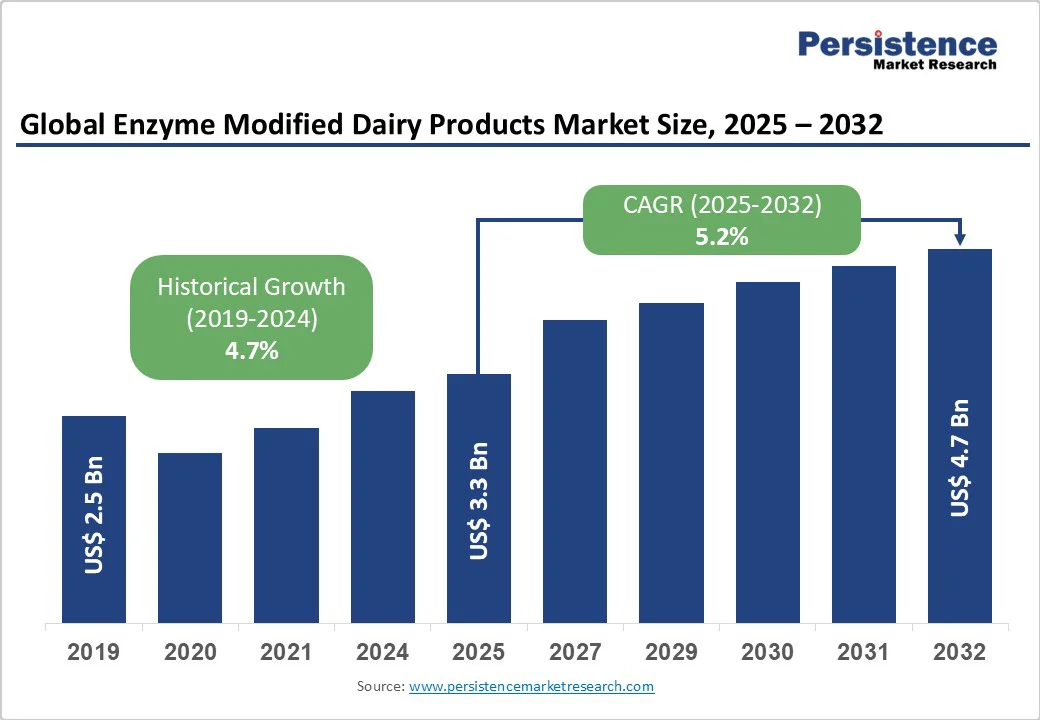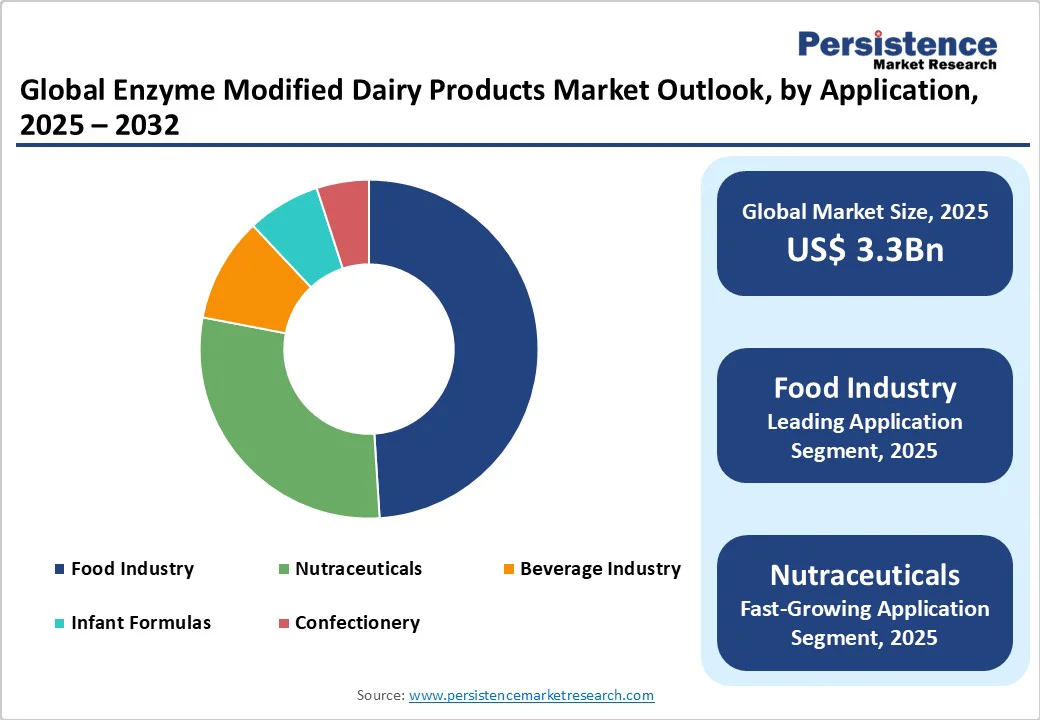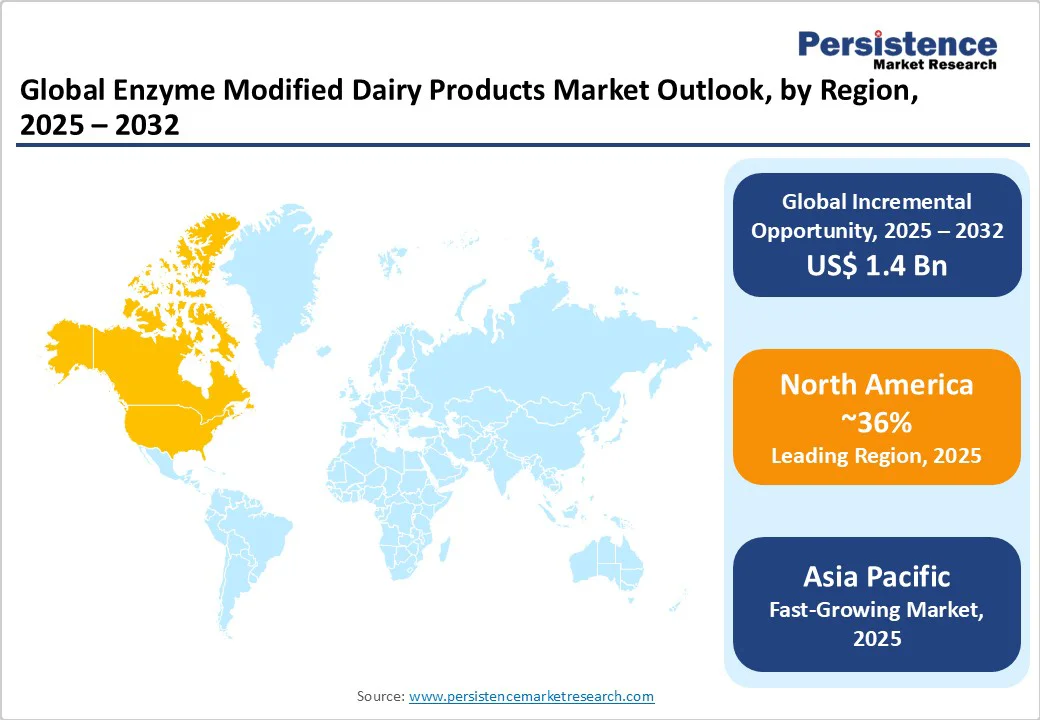ID: PMRREP31188| 196 Pages | 9 Oct 2025 | Format: PDF, Excel, PPT* | Food and Beverages

The global enzyme modified dairy products market size is likely to be valued at US$ 3.3 Billion in 2025 and is expected to reach US$ 4.7 Billion by 2032, growing at a CAGR of 5.2% during the forecast period from 2025 to 2032. driven by increasing consumer demand for enhanced flavor profiles, rising health consciousness, and advancements in enzyme modification technologies. The versatility of enzyme modified dairy products, offering improved taste, texture, and shelf life, has significantly boosted their adoption across the food, beverage, and nutraceutical industries.
| Key Insights | Details |
|---|---|
|
Enzyme Modified Dairy Products Market Size (2025E) |
US$ 3.3 Bn |
|
Market Value Forecast (2032F) |
US$ 4.7 Bn |
|
Projected Growth (CAGR 2025 to 2032) |
5.2% |
|
Historical Market Growth (CAGR 2019 to 2024) |
4.7% |

The rising consumer preference for functional and flavored dairy products is a primary driver of the enzyme modified dairy products market. Consumers today are more health-conscious and seek foods that provide additional nutritional benefits beyond basic sustenance. Functional dairy products, enriched with probiotics, vitamins, minerals, and protein, cater to this rising consumer awareness regarding digestive health, immunity, and overall well-being.
There is a growing preference for flavored dairy items, such as flavored milk, yogurts, cheeses, and cream-based products, which enhance the sensory experience and cater to changing taste preferences. Enzyme modified dairy ingredients play a crucial role in this trend by improving flavor profiles, texture, and nutritional value without compromising quality. For instance, they allow manufacturers to develop dairy products with unique tastes, reduced lactose content, or improved digestibility, meeting the evolving demands of modern consumers. Additionally, busy lifestyles and the expansion of ready-to-eat and processed foods further fuel this demand, as consumers increasingly opt for convenient, healthy, and flavorful dairy options. Overall, this trend is pushing dairy manufacturers to innovate and adopt enzyme-based solutions to remain competitive and meet market expectations.
The high costs associated with enzyme modification processes and stringent regulatory requirements pose significant restraints to market growth. The production of enzyme modified dairy products involves advanced biotechnological processes, specialized enzymes, and rigorous quality control, all of which contribute to elevated production costs. For small and medium enterprises (SMEs), these expenses can be prohibitive, limiting their ability to compete with established players. Additionally, compliance with food safety regulations, such as those imposed by the U.S. Food and Drug Administration (FDA) and the European Food Safety Authority (EFSA), requires extensive testing and certification, further increasing costs.
Regulatory challenges also include navigating complex labeling requirements for enzyme modified products, particularly in regions with strict clean-label standards. For instance, in Europe, manufacturers must ensure that enzyme modified dairy products meet stringent guidelines for allergen declarations and ingredient transparency, which can delay product launches and increase expenditures. These barriers are particularly challenging for new entrants and smaller firms, potentially slowing market expansion and innovation in the sector.
Advancements in enzyme technology and product innovation present a significant opportunity for the growth of the enzyme modified dairy products (EMDP) market. Modern enzyme engineering techniques, including recombinant DNA technology and immobilization methods, have enhanced the efficiency, stability, and specificity of food-grade enzymes. These technological developments enable manufacturers to create enzyme modified dairy products with improved flavor, texture, nutritional profiles, and digestibility, catering to evolving consumer preferences. For instance, novel enzymes can reduce bitterness in cheese, enhance creaminess in butter, or improve lactose breakdown for lactose-intolerant consumers, expanding the target market.
Innovation in product formulations allows for the development of functional and fortified dairy products, such as protein-enriched yogurts, probiotic cheeses, and flavored dairy beverages, which align with growing health-conscious trends. Continuous research and development in enzyme applications also allow for cost optimization and sustainable production processes, which can reduce operational expenses while maintaining product quality. Overall, leveraging advancements in enzyme technology not only enhances product differentiation and consumer satisfaction but also strengthens competitive advantage for manufacturers, positioning them to capitalize on the expanding global demand for high-quality, functional, and flavored dairy products.
Cheese dominates, expected to account for approximately 41% share in 2025. Its dominance is attributed to its widespread use in processed foods, snacks, and culinary applications, where enzyme modification enhances flavor intensity and reduces production costs. Companies such as First Choice Ingredients and Gamay Food Ingredients offer enzyme modified cheese solutions that cater to the foodservice industry, enabling cost-effective flavor enhancement for products such as sauces and dips. The versatility and scalability of cheese-based applications make it a preferred choice across commercial and consumer markets.
Yogurt is the fastest-growing segment, driven by increasing consumer demand for functional and probiotic-rich dairy products. Enzyme modified yogurt offers improved texture, flavor, and nutritional benefits, appealing to health-conscious consumers. The rise of lactose-free and high-protein yogurt variants, supported by enzyme technology, is accelerating adoption, particularly in North America and the Asia Pacific, where yogurt consumption is surging.
The food industry leads, holding a 49% share. The segment’s dominance is driven by the extensive use of enzyme modified dairy products in processed foods, ready-to-eat meals, and snacks. Enzyme modified cheese and butter are critical ingredients in sauces, spreads, and baked goods, offering enhanced flavor and cost efficiency. Companies such as Aarkay Food Products Limited provide tailored solutions for food manufacturers, ensuring seamless integration into production processes.
Nutraceuticals are the fastest-growing application, fueled by the rising demand for functional foods with health benefits. Enzyme modified dairy products, such as lactose-free milk and fortified yogurt, are increasingly used in nutraceutical formulations to support digestive health and nutritional supplementation. The growing focus on preventive healthcare and wellness trends is driving rapid adoption in this segment, particularly in Europe and the Asia Pacific.
Supermarkets and hypermarkets hold the largest market share, accounting for approximately 42% of revenue. These channels offer wide accessibility and a diverse range of enzyme modified dairy products, catering to consumer preferences for convenience and variety. Major retailers such as Walmart and Tesco stock enzyme modified cheese, yogurt, and milk, driving sales through promotional campaigns and strategic product placement.
Online retail is the fastest-growing distribution channel, driven by the increasing popularity of e-commerce platforms and changing consumer shopping habits. The convenience of online purchasing, coupled with the availability of premium and specialty dairy products, is boosting sales through platforms such as Amazon and regional e-commerce sites. The Asia Pacific region, in particular, is witnessing rapid growth in online retail for dairy products, supported by digital infrastructure and rising internet penetration.

North America is a dominant region in the global enzyme modified dairy products market, holding an estimated 36% share in 2025. The region’s strong position is primarily driven by its well-established dairy processing infrastructure, which allows manufacturers to efficiently produce a wide range of high-quality enzyme modified dairy products. The United States, in particular, plays a central role due to its advanced technological capabilities, extensive research and development facilities, and established cold chain logistics that ensure product consistency and safety. Consumer demand for functional and flavored dairy products further fuels market growth, as an increasing number of health-conscious individuals seek products enriched with probiotics, vitamins, protein, and reduced lactose options.
The presence of major industry players, including multinational dairy companies and enzyme technology providers, strengthens the competitive landscape and drives innovation in product formulations. The combination of regulatory support, rising disposable incomes, and evolving dietary preferences has created a favorable environment for market expansion. Overall, North America’s robust infrastructure, high consumer demand, and strong industry presence position the region as both a leading producer and key growth driver in the global EMDP market.
Europe is a significant player in the enzyme modified dairy products market, supported by strong regulatory frameworks and consumer demand for premium dairy products. Leading countries, including Germany, France, and the Netherlands, drive market growth through advanced dairy processing capabilities and a focus on sustainability. The European Food Safety Authority (EFSA) promotes stringent quality standards, encouraging manufacturers to adopt enzyme modified technologies that enhance product safety and shelf life. Companies such as Vika BV and Kasi Food B.V. are at the forefront of developing enzyme modified cheese and yogurt for both commercial and consumer markets.
The region’s emphasis on clean-label and organic dairy products is driving demand for enzyme modified solutions that align with consumer preferences for natural ingredients. Germany, in particular, is a key market due to its strong dairy industry and high consumption of cheese and yogurt. The growing popularity of plant-based dairy alternatives, supported by enzyme technology, is also contributing to market expansion. Europe’s focus on sustainable production and innovation in functional foods ensures steady growth in the enzyme modified dairy products market.
Asia Pacific is positioned as the fastest-growing market for enzyme modified dairy products, driven by rapid urbanization, increasing disposable incomes, and growing demand for processed dairy products. Countries such as China, India, and Japan are leading the region’s expansion, with China focusing on scaling its dairy industry to meet urban consumer demand. India’s dairy market, led by companies such as Amul, is leveraging enzyme modified technologies to enhance the flavor and shelf life of products such as cheese and yogurt, catering to a growing middle-class population.
The increasing need for functional and fortified dairy products to address nutritional deficiencies is driving demand for enzyme modified solutions in the region. For instance, lactose-free milk and yogurt are gaining traction in India, where lactose intolerance is prevalent among a significant portion of the population. Japan, known for its advanced food processing technologies, is adopting enzyme modified dairy for premium applications in confectionery and nutraceuticals. Supportive government policies, rising e-commerce penetration, and investments in dairy infrastructure are creating substantial opportunities for market growth in the Asia Pacific.

The global enzyme modified dairy products market is moderately consolidated, dominated by leading multinational companies alongside specialized regional players. In North America and Europe, major firms such as Organic Valley and First Choice Ingredients lead the sector through capacity expansions, advanced R&D capabilities, and strong partnerships with food manufacturers. These players emphasize product innovation, development of clean-label and lactose-free variants, and strengthening their supply chains through collaborations and regional investments. By focusing on enzyme technology advancements, sustainable production practices, and collaborations with foodservice and dairy manufacturers, they continue to expand their reach across functional and flavored dairy applications. In the Asia Pacific, rapid growth in the dairy sector is attracting both international and domestic participants, including Kasi Food B.V. and Jeneil Biotech Inc. Companies are leveraging joint ventures, regional partnerships, and tailored product development to meet local preferences, particularly in cheese, yogurt, and functional dairy products. Distribution is supported by local supply networks, strategic alliances, and emerging e-commerce platforms. Competition is largely driven by innovation in enzyme modified applications, sustainability initiatives, and regional expansion strategies. While global leaders dominate premium segments with branded and technologically advanced offerings, niche and regional players serve localized markets, maintaining a dynamic and evolving market landscape.
The global enzyme modified dairy products market is projected to reach US$ 3.3 billion in 2025.
The increasing demand for functional and flavored dairy products is a key driver.
The enzyme modified dairy products market is poised to witness a CAGR of 5.2% from 2025 to 2032.
Advancements in enzyme technology and product innovation are a key opportunity.
First Choice Ingredients, Kasi Food B.V., Gamay Food Ingredients, Jeneil Biotech Inc., and Organic Valley are key players.
| Report Attribute | Details |
|---|---|
|
Historical Data/Actuals |
2019 - 2024 |
|
Forecast Period |
2025 - 2032 |
|
Market Analysis |
Value: US$ Bn, Volume: As Applicable |
|
Geographical Coverage |
|
|
Segmental Coverage |
|
|
Competitive Analysis |
|
|
Report Highlights |
|
By Product Type
By Application
By Distribution Channel
By Region
Delivery Timelines
For more information on this report and its delivery timelines please get in touch with our sales team.
About Author